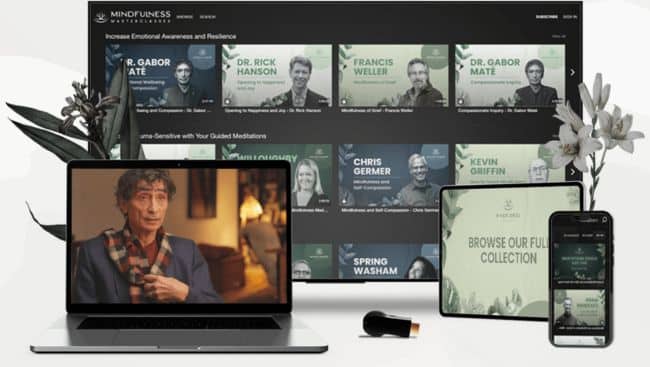Anxiety is an all-too-common human experience. According to some studies, up to 33.7% of people are impacted by an anxiety disorder during their lifetime. Yet despite its prevalence, you might not know too much about anxiety. How does it manifest in the body? What emotions can it lead to? Is it really so prevalent?
These 11 facts about anxiety highlight some of the most important and interesting things you might not know about anxiety. Some of these facts speak to anxiety as an emotion and others to anxiety as a disorder. Each fact also offers a mindful tip - something to consider or practice.

Anxiety Facts & What to Do About Them
Anxiety can present itself in the physical body.
While we often consider anxiety to be a ‘mental’ challenge, it can create physical challenges as well. The mind and body are, in fact, intertwined. Physical symptoms of anxiety include headaches, backaches, nausea, and an irregular heartbeat.
Useful tip: Research has found that mindful walking in nature may help to reduce anxiety symptoms. If it feels accessible for you, find a beautiful place to take a slow and mindful walk. Note if any physical symptoms of anxiety shift during the walk.
Anxiety prevalence increased by 25% globally during the COVID-19 pandemic.
Another of our top anxiety facts is this: The World Health Organization found that during the COVID-19 pandemic, anxiety and depression rose by a whopping 25%. Multiple stress factors were reported, including social isolation and the inability to work.
Useful tip: Research has found that social connectedness can reduce anxiety and depression. Boost your sense of community by calling a friend, joining a local community group, or checking in on your neighbor. The benefits are mutual.
Anxiety can lead to anger.
Though anxiety and anger are distinct, anxiety can lead to anger. This doesn’t mean that all feelings of anger have roots in anxiety, but some do. One explanation is that anger is an offensive anxiety response - the ‘fight’ in our stress response.
Useful tip: Studies suggest that meditation may help to reduce the intensity of and rumination on anger. If you notice anger, try taking a few deep breaths. Daily abdominal breathing of 20-30 minutes can reduce both stress and anxiety.
Only 43.2% of those with Generalized Anxiety Disorder (GAD) in the United States are receiving treatment.
Another of many anxiety disorder facts is that less than half of those with GAD in the U.S. are receiving treatment. An estimated 6.8 million adults in the U.S. are affected by the disorder. This means that millions of Americans may not be getting the help that they need.
Useful tip: Mindfulness and therapy complement each other very well. If you are a therapist, you may consider ways of bringing mindfulness into your work with clients. Research has shown that mindfulness-based interventions can help to reduce anxiety and depression symptom severity. This is another of many important facts about anxiety and depression.

Anxiety can impact the structure and function of the brain.
Anxiety can change physiology, such as the structure and function of the brain. For instance, research has found that pathological anxiety can cause impaired functioning and degeneration of the prefrontal cortex and hippocampus.
Useful tip: In contrast to the impacts of anxiety on the brain, meditation can give the brain a boost. One study found that long-term meditators had larger hippocampal dimensions as compared to control groups. With this in mind, consider developing a daily practice. Start small, choosing a length of practice that works for you. Let it grow from there.
An estimated 31.9% of U.S. youth aged 13-18 have had an anxiety disorder.
A couple more facts about anxiety disorders: Youth and children feel it, too. It is estimated that 31.9% of youth between the ages of 13 and 18 have had an anxiety disorder. Of this number, an estimated 8.3% have been severely impaired by it.
Useful tip: If you’re a parent or teacher, consider using mindfulness to support children and teens. Research has found that it can reduce anxiety, depression, and emotional intensity and duration among youth. Start small and simple, finding age-appropriate ways to share mindfulness. Or, you might simply start by beginning a conversation. Check in with your youth - with curiosity and compassion.
Anxiety can make you more susceptible to illness.
Chronic stress can weaken your immune system, which increases susceptibility to many illnesses. And how does stress relate to anxiety? Anxiety can be considered a reaction to stress. Therefore, if we are feeling anxious, there is probably stress underlying it.
Useful tip: If you’re chronically stressed, consider practicing yoga. Research has found that yoga can reduce stress and anxiety. Set an intention to do ten minutes of asana practice each evening to unwind.
Anxiety disorders can increase the risk of addiction.
Since anxiety disorders can cause much emotional discomfort, those with the condition may turn to addictive substances for comfort. This can be considered an attempt to self-medicate - to take the edge off the troublesome feelings.
Useful tip: While mindfulness is not a treatment for addiction, it is worth exploring our emotions with compassion. This practice doesn’t stop uncomfortable emotions from arising. Instead, it shifts our relationship with them. As Kevin Griffin, a leader in the mindful recovery movement writes:
“Sometimes thoughts and emotions seem overwhelming, even in the context of mindfulness. At these times you might fall back on compassion—not pity—for yourself, for the great task you are attempting: facing down the demons of the heart and mind.”

Anxiety can negatively impact your relationships.
When we struggle with anxiety, it often ripples into our relationships. Anxiety can make us dependent or avoidant, both of which can take a toll on our closest relationships. Research shows that those with anxiety disorder are more likely to experience poor relationship quality.
Useful tip: If anxiety is impacting your relationships negatively, there are a number helpful practices you can try. For example, you might try expressing gratitude for the relationship. Or, put your phone down to communicate with full presence.
Anxiety can impact your heart.
Another place that anxiety can show up in the body is in the heart. For instance, research suggests that people with GAD suffer from higher rates of heart attack and other cardiac events. The risk grows as the intensity and frequency of the anxiety grow.
Useful Tip: Research has shown that self-compassion may be associated with lower subclinical cardiovascular disease. To boost self-compassion, consider self-compassion meditation. Or, start each morning with an intention such as: I will be patient, kind, and gentle with myself today.
Anxiety disorders are the most common mental illness in the United States.
The last of our anxiety facts is a reminder that if you’re experiencing anxiety, you are not alone. In the United States, 40 million adults are affected yearly. While it is unfortunate that so many are struggling, it should also encourage us to reach out to loved ones. Chances are that others know something about what we’re going through.
Useful Tip: We’ve said it before, but it’s worth another mention: reach out to someone that you love or trust. This could be a friend, family member, or mental health professional. You do not need to struggle with anxiety by yourself. Mindfully note if there is any discomfort around seeking help. If so, start by talking to just one person you can trust. Expand your circle of support from there.
Key Takeaways
These important and interesting facts about anxiety show us just how prevalent anxiety is. They also show us the varied ways in which anxiety can impact our lives - from relationships to heart health to headaches.
Mindfulness and meditation can be used to support those with anxiety. However, please note that these practices are not treatments for anxiety. For severe anxiety or where trauma or addiction is present, speak to a doctor or mental healthcare professional for support.
And remember:













